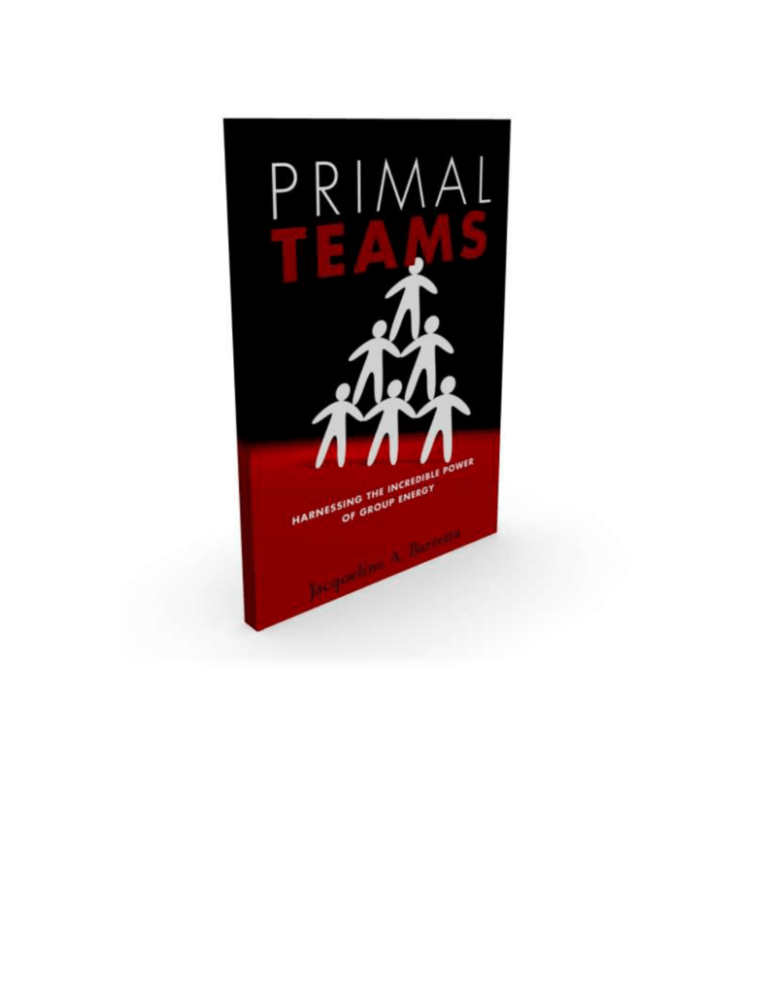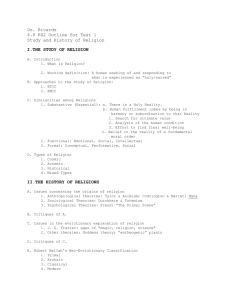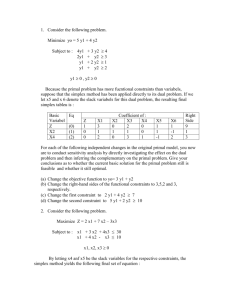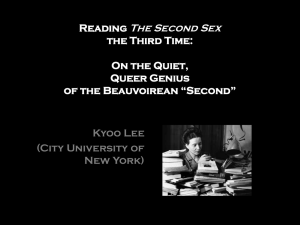Model Pre-Proposal
advertisement

The Pitch Who’s Afraid of the Big, Bad Wolf? Tyler, a team leader at Selco Industries, trudges into the office, worrying about his job. His boss, Liz, has asked him to stop by and chat about his team’s weakening performance and deteriorating morale. While Tyler works hard on his leadership skills, and his team likes him a lot, he can’t control a lot of what’s happening at Selco. Upper management keeps changing technologies, priorities and staffing levels, all of which undermine his team’s sense of mastery and security. To make matters worse, a constant merry-go-round in Selco’s top leadership keeps adding uncertainty about the organization’s direction and future. All of this keeps Tyler’s team feeling resentful and anxious and underperforming. During his meeting with Liz, she insists that he keep making the business case for all the changes. “Look,” she says, “the company’s moving in the right direction. I’m counting on you to sell it to your people and get them back on track.” Tyler tries every persuasion technique he knows, but nothing works. Then one day Tyler confides in his friend Jackie Barretta. “I’m stuck,” he admits. “Oh,” she says, “This isn’t a business problem, Tyler. It’s all about fear. Cold hard logic never conquers fear.” She goes on to describe how peoples’ emotions determine whether their team will turn in a stellar performance or languish unhappily in a swamp of mediocrity. “I’ll teach you a couple of emotional self-management techniques that will help your team handle all the scary stuff.” Each day for a week Tyler convenes a 15-minute team meeting, which he begins by stating his own worse fear. “I’m afraid we’re never going to master the new design tool. We won’t be able to deliver the software our customers want.” Jane chimes in, “Our new boss is going to cancel our project. I’m already polishing my resume.” The team visibly writhes with anxiety as they let themselves feel the full force of their emotions. The shame of failure flushes their faces. The fear of financial ruin burns in their stomachs. Then, after a few minutes of venting, Tyler guides the group through an exercise designed to shift their emotions from negative to positive. Soon Tyler’s boss notices a new vitality in Tyler’s team. Everyone seems freshly energized, exuding so much more confidence and enthusiasm. Best of all, they’re concentrating on solutions rather than problems. Liz takes him aside one morning. “I don’t know how you did it, Ty, but you’ve turned your gang around.” He just smiles and hands her his wellworn copy of Jackie Barretta’s book, Primal Teams: Harnessing the Incredible Power of Group Energy. Emotion is a team sport. It, more than anything else, spells the difference between stellar and mediocre team performance. Emotions spread like sheet lightning, either firing up or frying each person’s brain. They determine whether the group attacks its work with a “Never say die, cando” attitude or seizes every opportunity to make excuses for why they just can’t get the job done. Thanks to new discoveries in neuroscience, we now know that emotions operate independently of our logical minds and that we can most effectively influence them by tackling them directly, rather than by trying to fix them with rational thinking. Primal Teams: Harnessing the Incredible Power of Group Energy applies this knowledge to the workplace and shows how anyone can create and sustain the elite teams that get spectacular results. In its pages readers will learn the latest principles of team psychology as they read true stories of team success and failure. But the book goes far beyond merely explaining the principles of effective team building; it arms readers with an array of practical tools that will help them harness the incredible power of group energy. The Audience The Buyer Team leaders and team members in all sizes and types of organizations who want to boost creativity and performance in their teams, especially those for whom conventional performance improvement methods have failed to get desired results. Many of these people intuitively know that activating heartfelt emotion can supercharge a team, yet they can’t explain why it works or how to do it. Position Team leaders including corporate leaders and managers, project managers, supervisors, entrepreneurs and small business owners, and members of any team that needs to get better results. Students of business studying independently or in a classroom, coaches and consultants will also benefit from its advice. The book’s audience would love to: Build and guide teams that respond quickly and creatively to rapid changes in the business environment Go beyond conventional wisdom about team performance Master the latest state-of-the-art performance techniques Act on the intuition that heartfelt emotion can drive peak performance Strengthen their leadership skills Create a culture of innovative problem-solving Construct a more humane work environment Achieve extraordinary results The Competition Readers will add Primal Teams to their libraries because it represents the next important step in our understanding of team performance. Like many other popular business books, it offers insights from the latest research in psychology and neuroscience. Unlike many of its competitors, however, it invariably connects these insights to enhancing productivity, getting better results and improving the bottom line. The book will sit on a shelf that contains two different kinds of books: 1) those that explore the world of Emotional Intelligence and 2) those that reveal the most recent discoveries in neuroscience. Primal Teams blends elements of these subject areas into a unique perspective on team performance. Primal Teams goes beyond the conventional treatment of emotions in business. Current Emotional Intelligence books deal with the basics of optimism, cooperation, relationship building, and controlling negative emotions. Primal Teams takes those concepts to the next level, explaining how to create the powerful, positive emotional states that produce elite teams, the sort of teams that get the spectacular results demanded by today’s increasingly complex and demanding business environment. To paraphrase Santayana, “Principles without application are the assassins of high performance.” Taking that observation to heart, the author of Primal Teams gives readers the tools and techniques they need to enhance individual, team and leadership performance. She not only delineates the latest theories about harnessing the incredible power of group energy, she shows readers exactly how to do it. Readers will put Primal Teams on their desk alongside: Primal Leadership: Learning to Lead with Emotional Intelligence (Harvard Business Press, 2004) by Daniel Goleman, Richard Boyatzis and Annie McKee. The authors stress that a leader must first and foremost create resonance and positive feelings in those they lead. The leader, they argue, must accept full responsibility for the proper emotional state of an organization by always displaying a high-energy, optimistic mood. That mood ignites a chain reaction of similar emotions in the whole organization. When that happens, empowered employees will more likely accomplish their goals and satisfy new and old customers. Primal Teams explains many factors influence a worker’s emotional states, not just the leader, but also fellow team-mates, the work environment, and the employee’s self-management of their emotions. Whatever their source, optimal heartfelt emotions light up areas of the brain that boost creativity and cognitive skills. The book provides a broader picture of the ways leaders and team members can shape a group’s emotions and harness the power of group energy. Readers will benefit from its hands-on, boots-on-the-ground, down-to earth approach. The Emotionally Intelligent Team: Understanding and Developing the Behaviors of Success (Jossey-Bass, 2007) by Marcia Hughes and James Bradford Terrell. The authors cover the basics of teambuilding and using emotion to strengthen a team’s performance. The methods they describe are the conventional methods, including defining a clear purpose, enabling team members to get to know each other, leadership actions that set the emotional tone for the team, and encouraging team members to listen to each other and express themselves clearly. Primal Teams goes beyond the basics with an emphasis on turning weak teams into strong teams and strong teams into elite teams. It shows how to instill the emotions that evoke the most sought-after contemporary team competencies, from quickness, flexibility and resilience to innovation, complexity-management and the anticipation of customer needs. It explains that heartfelt emotion facilitates the highest level of team creativity and performance and presents unconventional techniques for shaping team emotions. Readers will benefit from practical advice on going beyond ordinary to extraordinary performance. Quick Emotional Intelligence Activities for Busy Managers: 50 Team Exercises That Get Results in Just 15 Minutes (Amacom, 2007) by Adele Lynn. This book provides activities that can help teams build stronger bonds and deal with emotional issues, such as resolving conflict, building trust and commitment, dealing with anger and emotional triggers. The authors hope the activities will help team members get to know their team-mates. Primal Teams also uses activities are designed to help team members connect with each other, but at a much deeper emotional level. In addition, these exercises build the super-energy that drives elite teams. With them a team that has already achieved a certain level of emotional intelligence can vault to the next level. From Chaos to Coherence: The Power to Change Performance (HeartMath LLC, 2008) by Doc Childre and Bruce Cryer. The authors present a scientifically-based case for bringing more heartfelt emotion into business organizations. They explain how heartfelt emotion enhances the brain’s creative and cognitive abilities. Readers gain a few basic tools for helping individuals experience more of the heartfelt emotion that reduces stress and improves performance. Primal Teams also sketches the scientific reasons for bringing heartfelt emotion into the workplace, but with stories and context and language tailored to a business audience. It offers tangible benefits that will help teams meet today’s perplexing business challenges. Stressing the connection between optimal emotions and the bottom line, it presents a broad array of practical techniques teams can use to generate those emotions. Shine: Using Brain Science to Get the Best from Your People (Harvard Business Review Press, 2011) by Edward Hallowell. The author uses his knowledge of brain science to counsel managers on ways to get the best performance from individuals and teams. He stresses the importance of selecting people based on their personal preferences, creating a climate of positive connection, providing a space for playful innovation and experimentation, helping people persist when the going gets tough, and making sure people know the organization values them. Primal Teams draws from some of the same science as Hallowell and makes a similar business case for the role of emotions in teams, but Barretta starts with a different premise: heartfelt emotion in a team lights up the cognitive and creative centers of the brain, which is the key to thriving in a complex business environment. Plus the author writes in a more conversational style aimed at businesspeople. Your Brain at Work: Strategies for Overcoming Distraction, Regaining Focus, and Working Smarter All Day Long (Harper Business, 2009) by David Rock. The author explains how individuals can tap into the latest discoveries in the field of neuroscience to become more effective and efficient in their jobs. He extols the benefits of storytelling, advises that people make key decisions during times of high mental energy, and provides pointers for maximizing mental resources. Primal Teams explores the role of primal emotions in business performance, which is an entirely different avenue of neuroscience and leads to entirely different conclusions about how to improve business performance. The two books complement rather than contradict each other. The Author Ms. Barretta possesses strong credentials as a successful business change agent. She’s built groundbreaking organizational cultures as a Fortune 500 executive, she’s won a reputation as a leading edge thought leader with her writing and speaking, and, as the Founding Partner of Nura Group, she’s pioneered new ways to conduct business through consulting and training. Ms. Barretta rose to the highest level in the field of Information Technology (IT) as the former Senior Vice President and Chief Information Officer for Con-way Inc., a $5 billion Fortune 500 transportation and logistics company. She served in that capacity for fifteen years, until 2011. Throughout her 28-year career in IT, she discovered how to boost the performance of teams by working with their primal emotions. As a consultant with Deloitte, as a manager in several Fortune 500 companies, and as CIO at Con-way, she pioneered a set of practices that led to her teams achieving unprecedented levels of customer and executive satisfaction and enabled her organizations to solve technology innovation challenges that eluded others. Her unique team practices produce the greatest employee engagement, attract the brightest minds in any field, and propel teams to peak levels of performance. Ms. Barretta’s work with primal emotions in teams has won her widespread recognition as a pioneering business leader. She and her organizations have received dozens of prestigious awards for innovation and achievement, including: o Premier 100 IT Leader from ComputerWorld, 2009 o IT Innovator of the Year, Information Week, 2008 o IT Executive of the Year, Society for Information Management, 2008 o Trucking Innovator of the Year, Commercial Carrier Journal, 2007 o Enterprise Value Award, CIO Magazine, 2001 o Seven CIO 100 Awards, CIO Magazine, 1999-2010 Ms. Barretta has published several articles, extolling elements of her revolutionary work with teams, in CIO and Information Week. Her team practices and unprecedented team accomplishments have been highlighted through numerous interviews and articles in prestigious publications, including Fast Company, Forbes, CIO, ComputerWorld, Information Week, Information World, Transport Topics, and Traffic World. Her reputation as a thought leader on the performance of IT organizations prompted several esteemed IT organizations to invite her to serve on their advisory boards, including: o Hewlett-Packard, 2010 to 2011 o Teradata, 2004 to 2010 o CXO Media’s CIO Executive Council, 2001 to 2011 Ms. Barretta left her IT career in 2011 due to her passionate desire to propagate her work on primal emotions in teams to a broader audience, beyond IT. She founded Nura Group in 2011 to deliver consulting, training and coaching services to enhance team innovation and performance. Every day Ms. Barretta and her partners present her groundbreaking model for shaping the emotional energy of a team, and they help clients adopt the practices. Their client list is large and growing, and they seize every opportunity to publicize and sell her revolutionary team model. Nura Group is positioned to propagate Ms. Barretta’s team model into many additional business organizations. State-wide Certified Public Accountant (CPA) associations have begun a pilot program in Rhode Island using her model to create a groundbreaking mechanism for valuing human capital. Eventually the associations will roll out this program to all 50 states. An affiliate of the Project Management Institute, Ms. Barretta has built a syllabus for teaching her organizational model to project managers. Her model serves as the centerpiece for a community of business pioneers associated with Marylhurst University, in Portland, Oregon, which she founded in 2012. Ms. Barretta constantly communicates her ideas in a popular blog. She also arranges for speaking engagements at high-tech events attended by thousands of people who work for technology giants such as MicroSoft, Cisco, and Intel. Ms. Barretta graduated with honors and a bachelor’s degree in Computer Science from the University of North Carolina at Charlotte and holds a master’s degree in Organizational Communication from Marylhurst University. She has received training in neuroscience to become a licensed HeartMath provider, and constantly communicates with HeartMath’s community of researchers in order to stay in touch with the leading edge research that supports her practice and her writing. Promotional Platform and Plan Jacqueline Barretta has built a strong marketing platform with which she vigorously promotes Primal Teams: The author’s website features Primal Teams and attracts over 10,000 page views per month (including blog), with about 3000 unique users per month. o Over 1100 readers have requested to be notified when Primal Teams is released. Approximately 4000 professionals are expected to attend Ms. Barretta’s training seminars on the subject of Primal Teams in 2013. In 2013, the author, as keynote or workshop presenter, will speak on the subject of Primal Teams to over 2000 people. Over 2000 recipients read the author’s monthly newsletter. Ms. Barretta has a robust social media platform (Twitter, Facebook Page, Facebook Profile, LinkedIn) of over 7500 direct connections, on which she promotes Primal Teams. Nura Group, the author’s consulting company, has strong and continuing consulting relationships with organizations that have over 16,000 employees and affiliates. Ms. Barretta’s articles on Primal Teams in trade and business magazines have reached almost 1,000,000 readers. In addition to her existing platform, the author will do the following in anticipation of and after publication: Retain a Public Relations firm to arrange for print and electronic media appearances that will augment the publisher’s effort Provide the book to all students in her educational seminars Sell the book at all of her conferences and speaking engagements Promote the book through her professional relationships Create a Primal Teams splash page that links to the promotion on her website INDEPENDENT PUBLIC RELATIONS FIRM With her publisher’s approval, Ms. Barretta will hire a business book public relations specialist for a minimum of three months. Ms. Barretta will also use this firm to help her secure speaking engagements. Additionally, she has hired New York marketing consultant Betty Rauch to help with imaging and branding the book. TRAINING Nura Group conducts training seminars for several huge professional organizations whose members have annual education requirements. Approximately 4000 professionals are expected to attend Nura Group’s seminars in 2013. When Primal Teams is available, it will be provided to all students. Certified Public Accountant associations, with a total membership of 700,000 who need 120 hours of education every three years to remain licensed. o The pilot training, which focuses on increasing the value of human capital as covered in Primal Teams, was conducted in Rhode Island in October of 2012, with about 75 attendees. o Nura Group is currently in negotiations to conduct this training in all states beginning fourth quarter 2013 and expects to conduct an average of two seminars per month with an average of 100 attendees for this organization. The Project Management Institute (PMI), with a total membership of 370,000 Project Managers who need 60 hours of education every three years to maintain their certification. o Ms. Barretta conducted two pilot seminars on March 6th, 2013 with approximately 20 attendees and March 14th, 2013 with approximately 50 attendees. o Nura Group is currently in negotiations for additional seminars to help Project Managers increase the performance of their teams as covered in Primal Teams and expects to conduct on average 2 to 3 seminars per month with an average of 75 attendees for this organization. Society of Human Resource Management, with over 250,000 members who need 120 hours of education every three years to remain certified. o Ms. Barretta is scheduled to speak monthly at seminars throughout 2013 on the topic of improving employee engagement, as covered in Primal Teams. Each session is expected to have approximately 50 attendees. o Nura Group is currently negotiating for additional seminars and expects to conduct one to two seminars per month with an average of 50 attendees for this organization. WEBSITE Ms. Barretta is a prolific writer with a popular website at http://nuragroup.com/ and a well-read blog at http://nuragroup.com/resources/articles/. Her website, including blog views, gets well over 10,000 page views per month, with about 3000 unique users per month. Additionally, 400 users receive a direct feed of her blog. She posts a new blog about three times per month. Over 2000 recipients read the author’s monthly newsletter, which recaps articles and events. Well over 1100 readers have already requested to be notified when Primal Teams is released. She has captured their contact details. A Primal Teams splash page will be activated as soon as the title is confirmed. SOCIAL NETWORK PROMOTION Ms. Barretta has built an extensive social network. She has almost 6000 fans on Twitter and Facebook, and over 1500 1st level connections on LinkedIn. In fact, LinkedIn announced that she has one of the top 1% most viewed profiles in 2012. She will continue to use these platforms to market the book. Her social media links can be found here for Twitter, Facebook Page, Facebook Profile and Linkedin. ADDITIONAL NETWORKS In addition to her social media networks, newsletter recipients, and individuals who have requested to be notified when the book is published, Ms. Barretta has well over 1000 professional contacts, who will receive notification when Primal Teams is available. Ms. Barretta leads a monthly discussion group and an annual conference, affiliated with Marylhurst University, where she explores new models for conducting business. In 2013, Marylhurst will advertise the discussion group and conference to the 2.2 million residents in the Portland, Oregon metropolitan area. The team model described in Primal Teams is a foundation for this group and will be included in the advertisements, discussions and conferences. Approximately 300 attendees are expected to attend, and the book will be on sale at the conference. SPEAKING ENGAGEMENTS Ms. Barretta speaks at numerous conferences and other events on the subject of Primal Teams, in addition to her educational seminars. Her business cards, which she distributes to all attendees, promote Primal Teams on the reverse side. In 2013, she’s on track to speak to audiences totaling over 2000, including: Project Management Monthly Summit, Portland Oregon, April 16, 2013, Team Building Lessons from Neuroscience, 120 attendees Stanford Graduate Symposium, San Rafael, California, June 22, 2013, Team Building Lessons from Neuroscience, 150 attendees Organization Development Network, San Jose, California, October 6, 2013, Team Building Insights from Neuroscience, 250 attendees In 2012, she spoke to audiences totaling over 1200, including: CIO Forum, Seattle, Washington, March 13, 2012, Team Building Lessons from Neuroscience, 110 attendees CIO Summit, Portland, Oregon, November 8, 2012, Team Building Lessons from Neuroscience, 90 attendees In 2011, she spoke to audiences totaling over 1000, including: Midsize Enterprise Summit East, Orlando, Florida, May 6, 2011, Creating a Winning IT Culture, 150 attendees Software Association of Oregon, Portland, Oregon, August 26, 2011, Team Building in IT, 150 attendees Ms. Barretta is in regular contact with these groups and is in the process of arranging additional speaking engagements with them, to promote Primal Teams. PUBLICATIONS Ms. Barretta has published numerous articles as both an award-winning CIO and a thought leader on the subject of Primal Teams. She is well known to the editors of many trade and business magazines as well as the journals of the major associations for which she is a speaker and educator. Ms. Barretta is currently in contact with these editors to arrange for articles about the book: Information Week (440,000 subscribers) o Published articles: The Cause Effect: Motivated Workers. January 2008 Empower Employees (Or Else). August 2008 CIO (circulation: 140,000) Published article - Agile at the Wheel. February 2009 HR Magazine (circulation 250,000+) PM Network® and PMI Today® from PMI Publications (circulation 350,000) Published article – Teambuilding Lessons from Neuroscience. May 2013 CONSULTING RELATIONSHIPS Through Nura Group, Ms. Barretta and her partners have strong consulting relationships with the following organizations. The author has incorporated the Primal Teams model into assessments and consulting practices used for these clients, all of whom represent potential buyers of the book. Esco Corp., with 4500 employees Oregon Organization Development Network, with over 3000 members and affiliate members Standard Insurance, with 2900 employees Portland General Electric, with 2700 employees Pacer, Inc, with 2500 employees and contractors The Portland Water Bureau, with 650 employees Biztek People, with 50 employees EasyStreet, with 40 employees Book Contents and Specifications Introduction – Caution, Team Brains at Work Chapter 1 - Hidden Energy: Unleashing Maximum Potential Chapter 2 – Primal Emotion: Shifting Feelings at the Source Chapter 3 – The Scary Stuff: Processing Fear and Negativity Chapter 4 – The Connective Web: Spreading Coherence in a Team Chapter 5 – The Sixth Sense: Honing Your Awareness Chapter 6 - Primal IQ: Activating Intuition Chapter 7 – The Engaged Heart: Connecting to a Deeper Purpose Chapter 8 – Team Spirit: Building Emotional Bonds Chapter 9 – The Culture Imperative: Negating Egotistical Separation Conclusion – Primal and Proud of It Projected Manuscript Length: 60,000 words Format: Hardcover and/or trade paperback and ebook Anticipated Delivery Date: 6 months from contract Form of Delivery: Microsoft Word, submitted electronically









